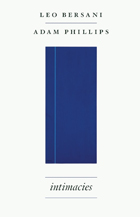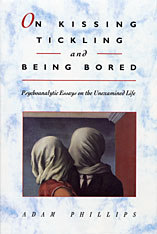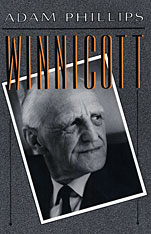
In pursuit of new forms of intimacy they take up a range of concerns across a variety of contexts. To test the hypothesis that the essence of the analytic exchange is intimate talk without sex, they compare Patrice Leconte’s film about an accountant mistaken for a psychoanalyst, Intimate Strangers, with Henry James’s classic novella The Beast in the Jungle. A discussion of the radical practice of barebacking—unprotected anal sex between gay men—delineates an intimacy that rejects the personal. Even serial killer Jeffrey Dahmer and the Bush administration’s war on terror enter the scene as the conversation turns to the way aggression thrills and gratifies the ego. Finally, in a reading of Socrates’ theory of love from Plato’s Phaedrus, Bersani and Phillips call for a new form of intimacy which they term “impersonal narcissism”: a divestiture of the ego and a recognition of one’s non-psychological potential self in others. This revolutionary way of relating to the world, they contend, could lead to a new human freedom by mitigating the horrifying violence we blithely accept as part of human nature.
Charmingly persuasive and daringly provocative, Intimacies is a rare opportunity to listen in on two brilliant thinkers as they explore new ways of thinking about the human psyche.

People tend to flirt only with serious things--madness, disaster, other people's affections. So is flirtation dangerous, exploiting the ambiguity of promises to sabotage our cherished notions of commitment? Or is it, as Adam Phillips suggests, a productive pleasure, keeping things in play, letting us get to know them in different ways, allowing us the fascination of what is unconvincing? This is a book about the possibilities of flirtation, its risks and instructive amusements--about the spaces flirtation opens in the stories we tell ourselves, particularly within the framework of psychoanalysis.
Phillips looks at life as a tale to be told but rejects the idea of a master plot. Instead, he says, we should be open to the contingent, and flirtation shows us the way. His book observes children flirting with their parents, our various selves flirting with one another, and literature flirting with psychoanalysis. As Phillips explores the links between literature and psychoanalysis--ranging from Philip Roth to Isaac Rosenberg, Karl Kraus to John Clare--psychoanalysis emerges as a multi-authored autobiography. Its subjects are love, loss, and memory; its authors are the analyst and the analysand, as well as the several selves brought to life in the process. A passionate and delightfully playful defense of the virtues of being uncommitted, On Flirtation sets before us the virtue of a yet deeper commitment to the openendedness of our life stories.

In a style that is writerly and audacious, Adam Phillips takes up a variety of seemingly ordinary subjects underinvestigated by psychoanalysis--kissing, worrying, risk, solitude, composure, even farting as it relates to worrying.
He argues that psychoanalysis began as a virtuoso improvisation within the science of medicine, but that virtuosity has given way to the dream of science that only the examined life is worth living. Phillips goes on to show how the drive to omniscience has been unfortunate both for psychoanalysis and for life. He reveals how much one's psychic health depends on establishing a realm of life that successfully resists examination.

Iris Murdoch once suggested that to understand any philosopher's work we must ask what he or she is frightened of. To understand any psychoanalyst's work--both as a clinician and as a writer--we should ask what he or she loves, because psychoanalysis is about the unacceptable and about love, two things that we may prefer to keep apart, but that Freud found to be inextricable. If it is possible to talk about psychoanalysis as a scandal, without spuriously glamorizing it, then one way of doing it is simply to say that Freud discovered that love was compatible, though often furtively, with all that it was meant to exclude. There are, in other words--and most of literature is made up of these words--no experts on love. And love, whatever else it is, is terror.
In a manner characteristically engaging and challenging, charming and maddening, Adam Phillips teases out the complicity between desire and the forbidden, longing and dread. His book is a chronicle of that all-too-human terror, and of how expertise, in the form of psychoanalysis, addresses our fears--in essence, turns our terror into meaning.
It is terror, of course, that traditionally drives us into the arms of the experts. Phillips takes up those topics about which psychoanalysis claims expertise--childhood, sexuality, love, development, dreams, art, the unconscious, unhappiness--and explores what Freud's description of the unconscious does to the idea of expertise, in life and in psychoanalysis itself. If we are not, as Freud's ideas tell us, masters of our own houses, then what kind of claims can we make for ourselves? In what senses can we know what we are doing? These questions, so central to the human condition and to the state of psychoanalysis, resonate through this book as Phillips considers our notions of competence, of a professional self, of expertise in every realm of life from parenting to psychoanalysis. Terrors and Experts testifies to what makes psychoanalysis interesting, to that interest in psychoanalysis--which teaches us the meaning of our ignorance--that makes the terrors of life more bearable, even valuable.

Lying on the couch, the patient must tell all. And yet, as the psychoanalyst well knows, the patient is endlessly unable--unwilling--to speak the truth. This perversity at the heart of psychoanalysis, a fine focus on intimate truths even as the lines between truth and lies are being redrawn, is also at the center of this book of essays by the renowned historian of psychoanalysis John Forrester. Continuing the work begun in Dispatches from the Freud Wars, Truth Games offers a rich philosophical and historical perspective on the mechanics, moral dilemmas, and rippling implications of psychoanalysis.
Lacan observed that the psychoanalyst's patient is, even when lying, operating in the dimension of truth. Beginning with Lacan's reading of Freud's case history of the Rat Man, Forrester pursues the logic and consequences of this assertion through Freud's relationship with Lacan into the general realm of psychoanalysis and out into the larger questions of anthropology, economics, and metaphysics that underpin the practice. His search takes him into the parallels between money and speech through an exploration of the metaphors of circulation, exchange, indebtedness, and trust that so easily glide from one domain to the other.
Original, witty, incisive, these essays provide a new understanding of the uses and abuses and the ultimate significance of truth telling and lying, trust and confidence as they operate in psychoanalysis--and in the intimate world of the self and society that it seeks to know.

Although he founded no school of his own, D. W. Winnicott (1896–1971) is now regarded as one of the most influential contributors to psychoanalysis since Freud. In over forty years of clinical practice, he brought unprecedented skill and intuition to the psychoanalysis of children. This critical new work by Adam Phillips presents the best short introduction to the thought and practice of Winnicott that is currently available.
Winnicott’s work was devoted to the recognition and description of the good mother and the use of the mother–infant relationship as the model of psychoanalytic treatment. His belief in natural development became a covert critique of overinterpretative methods of psychoanalysis. He combined his idiosyncratic approach to psychoanalysis with a willingness to make his work available to nonspecialist audiences. In this book Winnicott takes his place with Melanie Klein and Jacques Lacan as one of the great innovators within the psychoanalytic tradition.
READERS
Browse our collection.
PUBLISHERS
See BiblioVault's publisher services.
STUDENT SERVICES
Files for college accessibility offices.
UChicago Accessibility Resources
home | accessibility | search | about | contact us
BiblioVault ® 2001 - 2024
The University of Chicago Press









